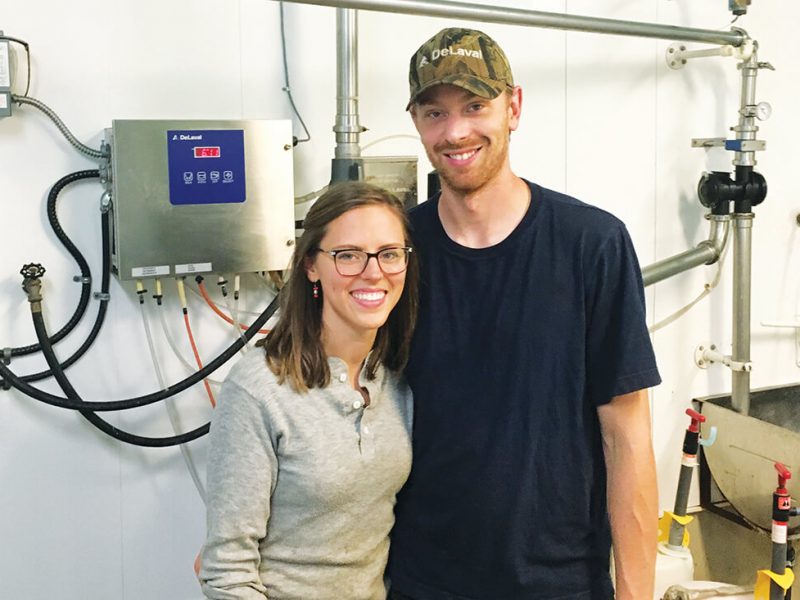ABBOTSFORD—The BC Milk Marketing Board has chosen the first three successful applicants in its New Entrant Program.
After clearing the waitlist in its previous Graduated Entry Program, the BCMMB introduced the NEP in August 2018. Ninety-five applicants paid the $250 fee to be included in the first draw, held in February 2019. A random draw selected eight applicants for the second step in the process. Each was required to submit a detailed business plan to a board-appointed selection committee.
Chaired by Walt Goerzen, who also chairs the board’s Milk Industry Advisory Committee and Specialty Producers Advisory Committee, the committee included two agri-business reps, one financial services rep, one processor rep from the Western Dairy Council, one producer chosen by the BC Dairy Association and one current GEP producer.
After meeting with each applicant and studying their business plans, the committee recommended and the board accepted Edward and Melanie Dyson of Port Alberni, Jonathan and Eleny Quapp of Rosedale and William Romeyn of Chilliwack to be the first three successful applicants.
“It was quite a challenge to pick three from the eight,” Goerzen said, noting they had a “diverse” set of applicants to choose from.
In the end they focused on each applicant’s experience, business plan and passion for the industry.
Experience was critical. The committee questioned the chances of an applicant succeeding without any direct experience in dairying, Goerzen says, and he expects the committee to recommend tightening future application criteria to weed out unsuitable applicants.
“It’s a new program so the process has some room for adjustments,” he notes, pointing out the BC Egg Marketing Board’s NEP has a more detailed initial application process which may have some merit in the dairy industry.
Another important question was whether the applicants could begin a dairy operation without the help of the NEP.
“Helping new entrants into the dairy industry that otherwise couldn’t do that is a key aspect of the program,” Goerzen states.
Edward Dyson, one of the three successful applicants, calls himself “a second-generation wannabe dairy farmer” at 27 years old. His parents, Agricultural Land Commission chair Jennifer Dyson and her husband, were once on BCMMB’s GEP waitlist but gave up waiting after several years.
Instead, the Dysons moved to Port Alberni in 2003 and started a water buffalo dairy. The herd has 70 animals and they’re currently milking 20 water buffalo. (The number fluctuates.)
“I’m already running a dairy farm, just with a different species,” Dyson says.
He and his wife, Melanie, a 24-year-old agricultural graduate of the University of Alberta, are already living on the family farm. Dyson is presently “an unofficial full partner” in the farm and he says the farm ownership will be reorganized to meet NEP requirements.
Dyson admits “a bit of nervousness” about the process but felt “we were good candidates. We spent quite a bit of time on our business plan.”
He believes he has a head start, noting the farm already has a double-four herringbone parlour for its water buffalo herd. The parlour will be retrofitted so it can be used to milk both the water buffalo, which they will continue to farm, and the dairy cows.
“Our goal is to start by this time next year,” he says. “We want to take our time to get healthy animals and do things right.”
As new entrants, the Dysons will receive 15 kgs of Continuous Daily Quota, worth $547,500 at the current quota exchange price, enough for about 12 to 13 cows. The program also provides a 1:1 matching grant of up to eight kgs for additional kilograms purchased on the exchange, something Dyson expects to take full advantage of.
“We hope to maximize the program within five years,” he says.
BCMMB manager of policy and communication Vicki Crites explains that the NEP quota is subject to a declining assessment of 10% a year.
“After 10 years they would cease to be ‘new entrants’ and would simply be considered producers,” she explains.
Dyson admits that even 31 kgs of CDQ may not be enough to make the farm fully viable as a stand-alone dairy but believes it is “a good start.”
“It’s pretty tough to get a start in the industry,” he says, noting, “we have the water buffalo to help us in the early years and hope to grow the dairy over time.”
Dyson admits he and Melanie are guinea pigs for the new program.
“With the water buffalo, we had to be open and transparent so we’re used to the attention. We’re happy to share our experience with the public and the industry,” he says.
Although the program accepted only three applicants this year, that will change.
“The 2019 NEP process was considered a transition year,” Crites says. “The board will run another NEP application and selection process in 2020 (and every second year thereafter). The 2020 process will select six new entrants for production starts in 2021 and 2022. New deadline dates and an updated user guide for the 2020 NEP selection process will be posted to the board’s website in fall 2019, with an expected application deadline early in 2020.”


 Vineyard damage lowers expectations
Vineyard damage lowers expectations